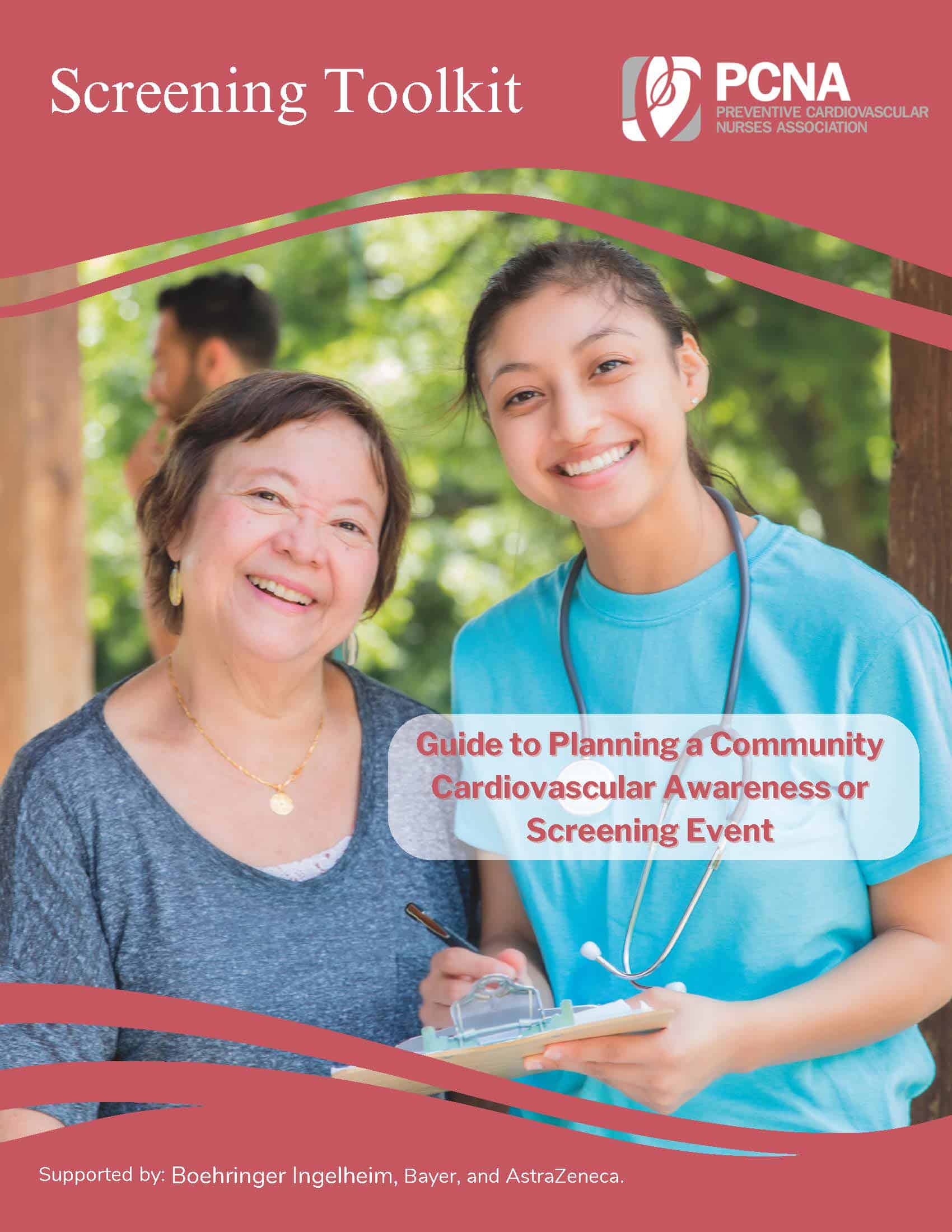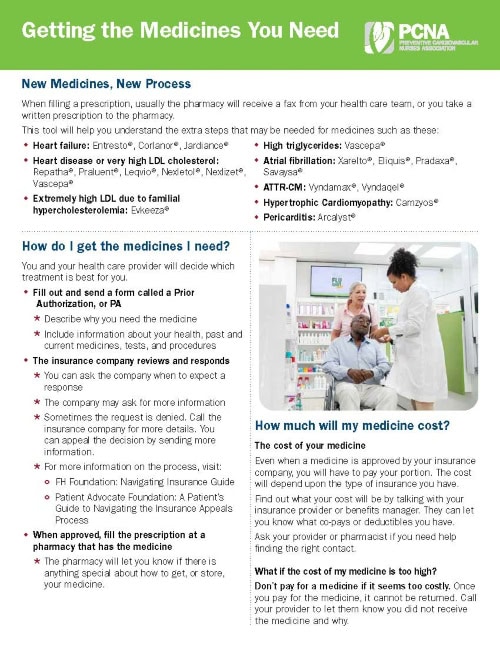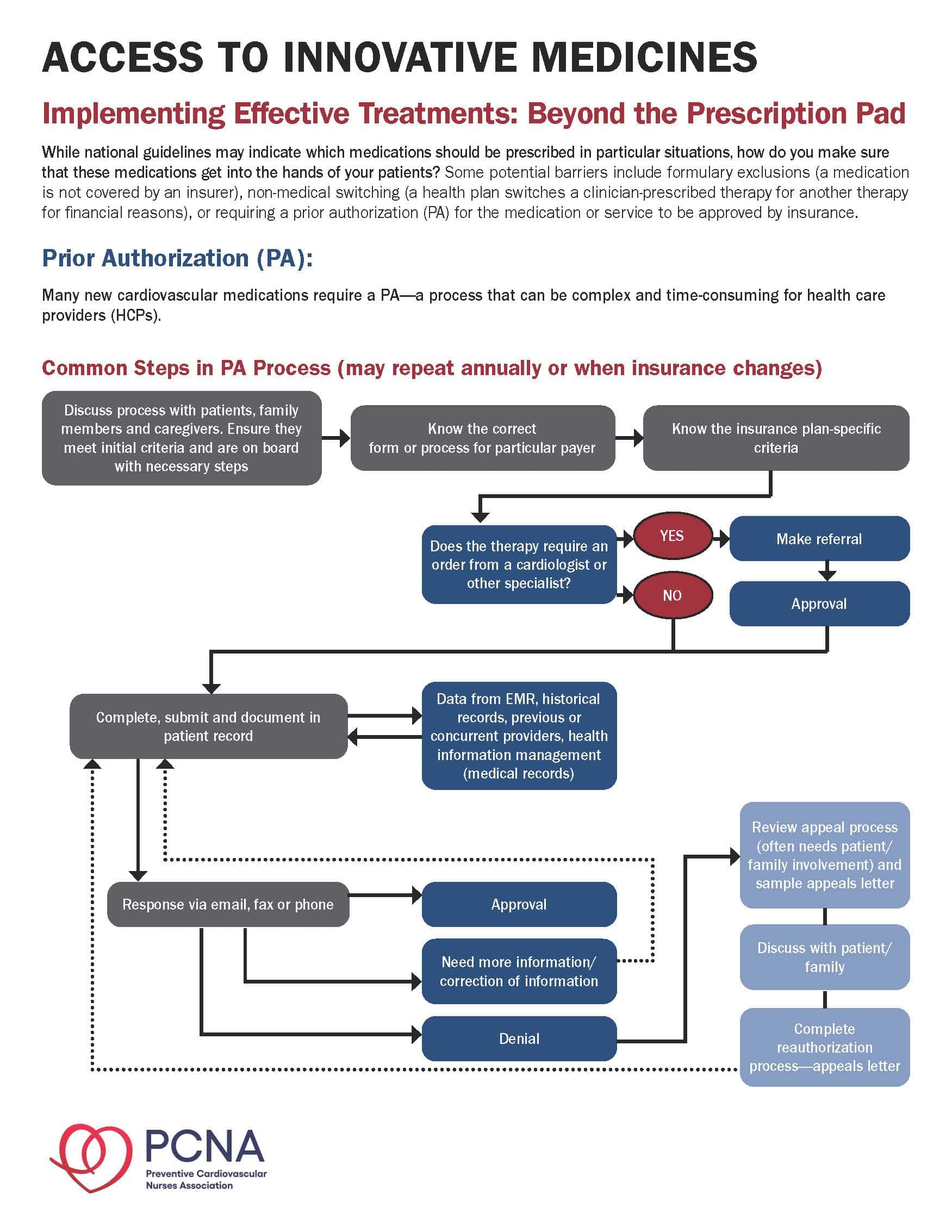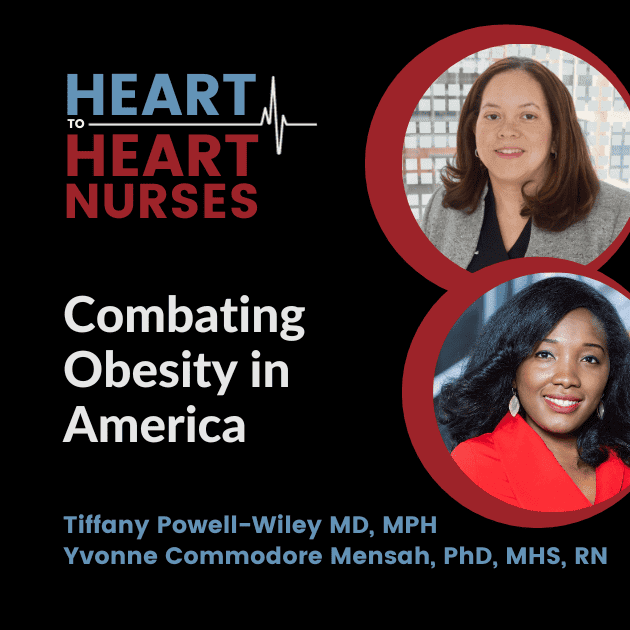Health inequities affect a variety of health issues, including the chronic condition of obesity. In this episode, learn about the disparate impacts of social determinants of health (SDOH) on obesity. Guests Yvonne Commodore Mensah, PhD, MHS, RN, & Tiffany Powell-Wiley MD, MPH, also investigate how the adoption of a holistic approach can positively impact obesity treatment, and how activating community health initiatives can help decrease rates of obesity in our patients.
This episode was recorded in partnership with Medical Alley and the Association of Black Cardiologists.
This podcast episode was supported by an independent educational grant from Novartis Pharmaceuticals Corporation and Pfizer Incorporated.
Welcome to Heart to Heart Nurses, brought to you by the Preventive Cardiovascular Nurses Association. PCNA’s mission is to promote nurses as leaders in cardiovascular disease prevention and management.
Geralyn Warfield This is the third of a three-episode miniseries on health equity brought to you in partnership with PCNA and Medical Alley. We hope you enjoy today’s guest episode. You can hear more from Medical Alley by following the Medical Alley podcast or visiting medicalalleypodcast.org.
Frank Jaskulke Good afternoon and good evening to everyone out there in Medical Alley. Thank you for joining us on another episode of the Medical Alley podcast. This is your host, Frank Jaskulke, and you’re [00:01:00] joining us in what is another fantastic podcast as part of our series in partnership with the Association of Black Cardiologists and the Preventive Cardiovascular Nurses Association. This time, continuing discussion on obesity in America and the impact of social determinants of health. Today, I’m joined by two fantastic guests. We’ve got Dr. Yvonne Commodore Mensah who’s an associate professor at Johns Hopkins School of Nursing, and Dr. Tiffany Powell Wiley, a physician scientist at the National Institutes of Health. Appreciate you both being on today, and maybe where we’ll start is just to give a quick background on each of you and your work, and maybe Dr. Commodore Mensah, if you wouldn’t mind, start and introduce yourself.
Yvonne Commodore Mensah Thank you so much for that introduction. My name is Yvonne Commodore Mensah. I’m an associate professor at the Johns Hopkins School of Nursing and the Bloomberg School of Public Health.
I’m also board member of the Preventive Cardiovascular Nurses [00:02:00] Association. And I’m a nurse by training, but I’m also a cardiovascular disease epidemiologist. And my program of research focuses on how we might advance equity in cardiometabolic health using implementation science. That is implementing the effective strategies that we know reduce the burden of cardiovascular disease as well as community engagement. So how we might go into communities to increase awareness about cardiovascular disease and the risk factors as well as implementing community-based projects as well.
Frank Jaskulke Oh, thank you. I appreciate that and dr. Powell Wiley. Same to you. Would you mind introducing yourself?
Tiffany Powell Wiley Sure. Hi everyone and thank you so much for the opportunity to be here today. My name is Dr. Tiffany Powell Wiley. I’m trained as a cardiologist and epidemiologist and as mentioned I’m a [00:03:00] physician scientist at the National Institutes of Health. I’m a Statman investigator in the intramural program at the National Heart, Lung, and Blood Institute. And I have a joint appointment at the National Institute on Minority Health and Health Disparities.
My research at NIH focuses on how social determinants play a role in the development of cardiovascular disease. And we look at that in several ways. We utilize population level data to understand these relationships. We work within communities to develop interventions that target cardiovascular health. And being at the NIH, we do quite a bit of work looking at mechanisms, but mainly biologic mechanisms, by which we understand how social determinants really get under the skin. I’m also a member of the Association of Black Cardiologists.
Frank Jaskulke Thank you. I appreciate having you both on today. Dr. Powell Wiley, a question for [00:04:00] you. Some of our listeners may not be as familiar with this area. Could, a really fundamental thing, could you define for us what do we mean when we say cardiometabolic disease?
Tiffany Powell Wiley So I think that’s a great question to really highlight, what is cardiometabolic disease? We know, of course, what heart disease is, but metabolic disease can be a little more tricky to understand. And so, of course, we know heart disease and vascular disease relate to those issues that affect how your blood vessels, how your heart works. But metabolic diseases really come about based on how your body metabolizes or takes in and uses nutrition as energy. And so we know that if a person has difficulty with breaking down the nutrition that they take in, or if they are triggered to take in more food than they actually need, then they can develop diseases like obesity. Where your body develops excess [00:05:00] adipose tissue and you can also develop diseases like diabetes or high cholesterol and those are what we think of as metabolic diseases.
These metabolic diseases like that, like I said, obesity, diabetes, high cholesterol, these can lead to things related to heart disease like high blood pressure, hypertension, coronary artery disease, stroke, heart failure and even peripheral vascular disease. And so we really don’t always think about how these metabolic diseases are really interconnected with heart disease, but also that they’re interconnected with the development of things like kidney disease and kidney failure.
Frank Jaskulke Very interesting. And I understand much of your research has been in the areas of community-based interventions. And I’m curious when we think about that, that intersection of disease and cardiometabolic disease, what have we learned or what is some of the [00:06:00] research shown? As it relates to community-based interventions.
Tiffany Powell Wiley So one of the areas where we’re really trying to put an emphasis on is on how we can engage at risk populations in developing interventions that improve cardiometabolic or heart health in general. And so we can think of community engagement as a way of really partnering with community members, with community leaders to identify the targets for an intervention and, but also to identify ways in which we can actually develop that in intervention really based on feedback from community members. And so there are many different examples out there of how this type of work is being done. Just to give you an example of how we’ve done some of that work, in Washington, D. C. with the groups that we work with, we work in partnership [00:07:00] with a community advisory board. And with that community advisory board, we try to develop interventions around physical activity and diet to see how we can implement those interventions in the community, but also with community feedback. And so many of the tools that we’re using in these interventions have been developed based on focus groups, based on work that we do with community members to understand what works and what doesn’t work, before we implement a full, full-scale intervention.
Frank Jaskulke Oh, thank you. And, and Dr. Commodore Mensah, I understand you had recently co-authored a research study on the cardiometabolic health of African immigrants in high income countries. I’d be curious. What were some of the findings of that study and how might it relate to this broader discussion?
Yvonne Commodore Mensah We conducted this study [00:08:00] primarily to understand the cardiometabolic health of African immigrants in high income countries. We know that the U. S. has a large population of immigrants, but also a growing population of African immigrants.
And so we wanted to understand the burden of these risk factors, including hypertension, diabetes, obesity, high cholesterol, which are risk factors that are relevant to our conversation today. We also know that when immigrants arrive in the U. S. prior research has shown that they are often healthier than the U.S. population. But over time they accumulate certain risk factors, including obesity, and there are different reasons for this phenomenon. For instance, they may not have access to the foods that they’re used to, but they may have [00:09:00] easier access to foods that are unhealthy. And if I may use myself as an example, I am considered an immigrant when I arrived in the U.S. in 2004, within six months, I gained about 20 to 30 pounds and that’s because I had access to food. Foods that I rarely had access to growing up in Ghana. For instance, soda was unlimited in the cafeteria in college. I had access to pizza every day. So foods that are linked with what a higher risk of developing obesity, for instance, sugar, sweetened beverages. So that for me was a culprit. And so for many immigrants, when they migrate to high income countries, they move into environments that are considered obesogenic, meaning that the environment makes it easier for them to [00:10:00] access foods that are unhealthy, but also limits their opportunities to participate in physical activity to prevent obesity.
So in this research, we found that the prevalence of obesity among immigrants was fairly high and was highest among Nigerian immigrants. but was lowest among Ethiopian immigrants. So the other lesson there is that the African immigrant population is not a homogenous group. So there was some heterogeneity in the burden of these risk factors, including hypertension, diabetes, smoking, and obesity.
Frank Jaskulke A very important distinction to understand, and I’d be curious, Dr. Powell Wiley, in your work, how are you seeing these social determinants play out, and does that influence how we might approach the community-based interventions as well?
Tiffany Powell Wiley So we know from many [00:11:00] studies, including studies from my research group, that the social determinants, these factors related to health care factors related to the neighborhood factors that that you’re exposed to things like exposure to crime to lack of safety within an environment to limited and unsafe housing. All of these can play a role in the development of obesity, but also diabetes and cardiovascular disease. We’ve shown, for instance, that if you live in an area where your levels of safety go down over time, you’re more likely to gain weight over time. Or if you live in an area where you actually feel less, that the resources aren’t available in your neighborhood, you’re less likely to, or you’re more likely, to develop obesity over time.
And [00:12:00] so when we think of the interventions that may work in some of these communities, we want to, again, engage community members on what interventions might look like, but we also want to make sure that we are, that we link participants to potential resources for improving their cardiovascular health. And so one area that we’re trying to see is if looking at working in the community, if we can link participants in a study to resources for physical activity, we want to see whether or not that can increase their levels of physical activity over time. And so that’s one of the areas of active research in our group. But we know that, as I said, social determinants really play a key role in not only the rates of obesity and diabetes that we’re seeing in the United States, [00:13:00] but also in the rates of cardiovascular disease. Where we know, for instance, from some of our work, that counties that have the highest rates of cardiovascular mortality are those areas that are most impacted by adverse social determinants.
Frank Jaskulke Yeah, this has been a theme we’ve heard across the different discussions on the importance of understanding social determinants of health. Of the things that are beyond what we might have historically thought of as being directly relevant to health and how impactful they are. Dr. Powell Wiley, you had mentioned the physical activity part, and I might start with you, but I would ask both of you this question. You know, we work with a lot of different technology companies, and we’ve seen different things developed around like, wearables and mobile health technologies. Do you see those as having opportunities or challenges to make an [00:14:00] impact when we’re looking at obesity or when we’re looking at cardio metabolic health?
Tiffany Powell Wiley So we can certainly think of wearable technology and digital health tools as a potential way of reaching communities and populations who may have limited access to health care or may not be able to be seen in the health care setting on a regular basis. We really can see that as an opportunity for reaching those populations.
The issues that we need to really address and think about are how usable are these digital tools? Particularly when many of these tools have not been developed with diverse populations in mind. And so I’ll just give you a very brief example of what we’ve seen in our physical activity study. So we provide participants with blood pressure cuffs to check their blood [00:15:00] pressure at home. And it’s a Bluetooth enabled blood pressure cuff. So it connects to their phone and allows them to monitor their blood pressure on their phone. But one of the issues that arises is because these blood pressure cuffs haven’t been developed for all patients of all shapes and sizes, many times the cuff may not fit the participants in our study, and we have to figure out how to deal with that.
And so one of the areas I think is really critical to think about is how can more of these technologies really start by testing and working with diverse populations as they go through their design process. So that these really are accessible and available to a broad range of populations.
Frank Jaskulke Well, thank you for sharing that. And I hope our technology companies that are listening heard that point very clearly. It’s [00:16:00] such a fundamental thing. Dr Commodore Mensah any comment from you?
Yvonne Commodore Mensah Yes, I will add that we know that regular physical activity is one of the most effective means for preventing and intervening when a person has obesity. And we know that these wearable devices, when you look at pedometers, smartwatches, accelerometers, these are supposed to offer easy and convenient ways for people to track their physical activity. But a lot of these technologies rely on sensors that are optical in nature. So their functionality also depends on the interaction of light with multiple layers of skin. And we also know that some studies have shown that some of these wearables have higher levels of error. Especially for people with darker skin tones or higher body mass [00:17:00] index. We learned this lesson also in terms of pulse oximeters. Very early on during the COVID 19 pandemic where they are reported to not work as well in black populations because of how the technology was developed. And most of these technologies as Dr. Powell Wiley alluded to, are not well validated in diverse populations. So we also need to improve the accuracy of these devices and ensure that in the design. And in validation of these products we employ what we call universal design and making sure that these devices are accessible to all people, regardless of their age, any disability, other factors, including their weight. And we should consider these factors in the development and validation of [00:18:00] these devices.
Frank Jaskulke Thank you. And indeed, that’s an area where, as we’ve worked with the FDA and other regulatory bodies has come up consistently, has proven to be a challenge in the industry, but one that I hope will continue to highlight and continue to advocate for. Where I might close out the discussion then is, is on the advocacy and the policy side. And I’ll ask you, Dr. Commodore Mensah, are there things that you would think about that you would tell our listeners could be impactful in the policy realm if we made changes. And for those listeners, are there things you might advise as far as how they can get involved in the advocacy work to help combat the obesity issue within the United States?
Yvonne Commodore Mensah Absolutely. One of the things we need to consider is that, as Dr. Powell Wiley alluded to, social determinants really do shape obesity and the burden of cardiometabolic disease in the [00:19:00] United States. And one of the issues we have, unfortunately, is food insecurity. But more importantly, nutrition insecurity. What do we mean by that? So food insecurity deals with access to the quantity of foods, right? But nutrition security deals with the food quality. So we should focus not only on the quantity of foods and access to foods, but also high-quality foods that help to prevent obesity. And so along those lines, I think it’s important that listeners support local and federal policies that provide additional funding to programs such as SNAP, the Supplemental Nutrition Assistance Program, also childcare and educational programs such as Head Start. And CDC also has a healthy schools initiative that seeks to address the obesity [00:20:00] epidemic. And so all of these endeavors seek to address obesity as a risk factor for cardiovascular disease, but also prevent obesity in young adults and children. We know that obesity is a major issue in the U.S., but also in children. And so if we want to protect the coming generations of Americans, we need to support these local and federal policies.
Frank Jaskulke Thank you. I appreciate that. And I’ll say as a, a semi-retired lobbyist, advocating for those changes is so important and I appreciate the work that the association community does in this realm. And with that, I want to say Dr. Commodore Mensah thank you so much for your time. And Dr. Powell Wiley, thank you so much for your time and both of you joining us on the podcast today.
Yvonne Commodore Mensah Thank you so much for having us.
Tiffany Powell Wiley Yes. Thank you very much. Thank you. It was a great pleasure.
Frank Jaskulke And folks, that’s been another episode of the [00:21:00] Medical Alley Podcast. This one part of the continuing series in partnership with the Association of Black Cardiologists and the Preventative Cardiovascular Nurses Association. If you’re not already a subscriber, you can find us on MedicalAlleyPodcast.org, on Apple, Spotify, and now on our YouTube channel. And hey, do me a favor. Would you share this episode with at least one other person? Help spread this story and this information a little bit further. I’d really appreciate it. Until next time, have a great day.
Thank you for listening to Heart to Heart Nurses. We invite you to visit PCNA. net for clinical resources, continuing education, and much more. [00:22:00]
Topics
- Health Equity
- Obesity Management
Published on
September 19, 2023
Listen on:

MD, MPH

PhD, MHS, RN, FAAN, FAHA, FPCNA
Related Resources










